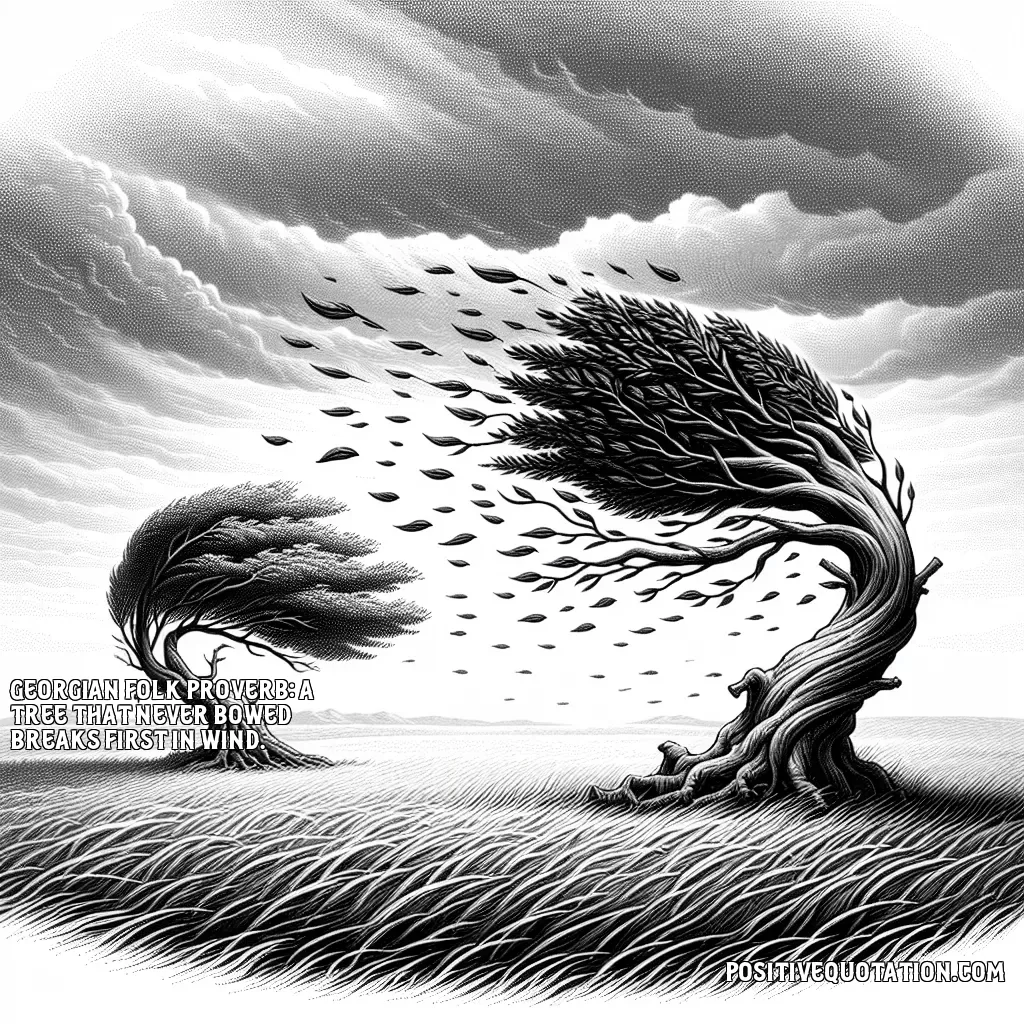
Georgian Folk Proverb: A tree that never bowed breaks first in wind.
Author: Georgian Proverb
👁️ 7 views

Georgian Folk Proverb: A tree that never bowed breaks first in wind.
👁️ 7 views
The Georgian folk proverb, "A tree that never bowed breaks first in wind," provides a vivid metaphor for the importance of adaptability and humility in the face of life's challenges. It suggests that rigidity and an unwillingness to adapt can lead to downfall or failure when external pressures become overwhelming. Imagine a sturdy tree standing tall in a forest, its trunk unyielding and branches reaching stiffly to the sky. Initially, this tree might appear resilient and strong, a symbol of endurance. However, when the winds of a fierce storm sweep through the forest, this same rigidity becomes a liability. Without the ability to sway and bend in response to the powerful gusts, the tree's branches are more likely to snap, and the trunk may even break under the strain. In human terms, this proverb warns against the dangers of inflexibility in one's attitudes and behaviors. Often, individuals who remain stubborn and refuse to compromise or adapt to changing circumstances are the ones who struggle most when faced with adversity. Just as a tree that can bend is more likely to survive a storm, people who exhibit flexibility and humility are generally better equipped to navigate life's inevitable ups and downs. Moreover, the proverb highlights not only the importance of adaptability but also the value of humility. By "bowing," or being open to change and different perspectives, individuals can prevent the rigid arrogance that often precedes a fall. In essence, the proverb teaches us that strength comes not from inflexibility, but from the ability to yield and adapt with grace when necessary.
Quote By: Georgian Proverb
**Georgian Proverb: A Reflection of Culture and Wisdom**
The Georgian proverb, "A friend in need is a friend indeed," encapsulates the essence of friendship and loyalty in Georgian culture. Proverbial wisdom has been an integral part of Georgian life, allowing for the transfer of moral and ethical values through generations. These sayings showcase the deep-rooted beliefs and traditions that characterize Georgian society, often reflecting the harmonious relationship between nature and humanity.
Georgia, a country nestled at the crossroads of Europe and Asia, boasts a rich history that is reflected in its proverbs. Each saying carries the weight of cultural significance, providing insights into the values that Georgians uphold. The proverbs often address themes such as family, love, resilience, and community, emphasizing the importance of relationships and social cohesion. For instance, the proverb, "Better to be poor with friends than rich without," highlights the value placed on relationships over material wealth. This sentiment is echoed throughout many aspects of Georgian life, from their renowned hospitality to the way they celebrate life through traditional music and dance.
The significance of proverbs in Georgian culture can also be tied to the country's unique history, which has shaped its linguistic and cultural landscape. Throughout centuries of invasions and occupations, this small nation has maintained its identity through language, art, and folklore, with proverbs serving as a verbal embodiment of that heritage. Georgian proverbs serve as a tool for teaching life lessons, offering practical wisdom in a poetically concise format.
As the scholar Richard H. Smith notes in his studies on Georgian folklore, "Proverbs not only reflect the values of a society but also serve to reinforce them." This reinforces the idea that proverbs are not merely linguistic artifacts; they are living expressions of collective consciousness. Georgian proverbs have become a way to navigate the complexities of modern life, underscoring that while the world may change, the core tenets of friendship, loyalty, and community remain timeless. Ultimately, the enduring nature of Georgian proverbs highlights the profound wisdom that continues to guide individuals and families alike, proving that these age-old sayings are as relevant today as they were centuries ago.